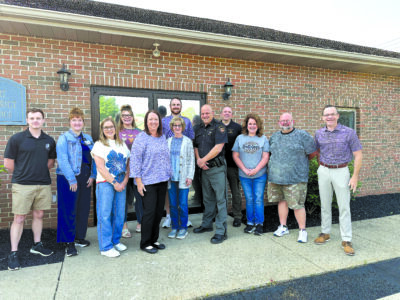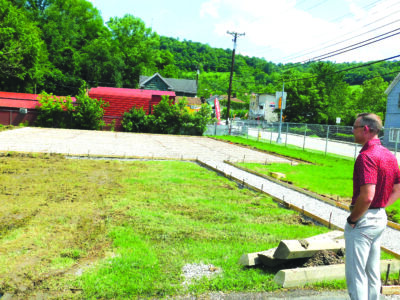Coronavirus misconceptions grow as virus spreads

MARTINSBURG, W.Va. — State Sen. John Unger has seen the effects of COVID-19. A good friend of his, David Sanders, is fighting for his life and is currently in critical condition, using a ventilator as he battles the virus.
“I’ve heard people say that it’s a hoax,” Unger said. “Well, you tell that to his family then. I absolutely know it’s not a hoax. There are these people who think we never landed on the moon, and there are people who believe the world is flat.”
Unger has been a senator representing Jefferson and Berkley counties for 20 years. He’s also a pastor of three different churches.
“My constituents and my parishioners are being impacted by this,” he said. “It’s devastating. The bottom line is I know it’s real because I know people have been impacted by it, and I’m not able to visit them as a pastor.”
Unger said he suspects that people who vocalize a disbelief in the pandemic are frustrated with the government and inconsistencies with handling and reporting the pandemic.
“I can understand the sentiment that people don’t trust the government,” he said. “I don’t trust the government, and I’m an elected official.”
One of those inconsistencies, he said, is the way the states shut down in March. Yet now that numbers are starting to climb again in many reopened states, governors are refusing to shut things down again.
“So I guess people are questioning if they’re not doing anything about it now, why did they do anything about it in the first place?” Unger said. “It’s inconsistent messaging. It leads people to doubt and they can’t make rational decisions.”
In more rural regions, like Alpena, Mich., case numbers were lower recently than they were last month. That’s one reason why Mike Centala, a farmer in Alpena County, thinks the COVID-19 restrictions in his county should not have been the same restrictions as more densely populated areas.
He said he believes the pandemic was “overblown.”
“We have really bad flu seasons, but this has been magnified so much that people are scared,” he said. “The flu can kill you, too, if you’re not healthy or have pre-existing conditions.”
Centala suspects the coronavirus “went through” his area in late January and early February, as some of his family members were ill with a dry cough.
“I believe it’s over in this area,” he said. “Could it come back? Sure.”
Unger, however, is adamant that the virus isn’t over. In fact, he believes there are more cases of coronavirus in his state than what is being reported. He also believes that there isn’t enough testing.
“This game’s not over yet,” he said. “We may not even be in the second half yet.”
Carrie Brainard, public information officer for the Mid-Ohio Valley Health Department, said she’s seen people on social media say that they believe the dangers of the pandemic were exaggerated.
“It’s a pandemic — it’s a new thing, and they’re still working through what is and isn’t going to happen with it,” Brainard said. “My concern is that we don’t want the public to get complacent and start thinking that, since people are surviving, it’s over with.”
There’s a “misconception,” Brainard said, that if people were sick in January, they are likely immune to the novel coronavirus.
“But they haven’t seen that to be the case with COVID-19,” she said. “To assume that is not a wise idea.”
She also said people assume that because they don’t often get the flu in the summertime, they won’t contract coronavirus during the summer.
“Because the case numbers have gone down and stayed low, people think it’s over,” Brainard said.
Her department, which covers a six-county region with about 160,000 people, has only reported 79 positive cases since the pandemic began, Brainard said. Those low numbers could change, however, if people stop taking precautions, she said.
“We’re now seeing in West Virginia, people are coming back from Myrtle Beach, which is a hot spot at the moment, and they’re coming back with COVID-19 because they didn’t social distance or wear a mask while they were there,” Brainard said. “It is an inconvenience to have to wear a mask, but it’s better to be safe than sorry.”
In the Eastern Panhandle, Unger said that “hardly anyone” is wearing masks anymore, while just across the border, in Maryland, people are required to wear them.
“That virus doesn’t stop at county lines,” he said. “We’re playing a very dangerous game in acting like nothing is happening.”
In Pennsylvania, which has reopened with capacity and social distancing restrictions, Gov. Tom Wolf is strongly encouraging people to continue wearing masks, according to a Tuesday news release.
“Mask-wearing needs to be a part of our everyday routines,” he said in the release. “When you leave the house, grab your keys, your wallet and your mask. Mask-wearing has proven to be an important deterrent to the spread of the virus and keeping Pennsylvanians safe and healthy is the goal as we reopen and continue our mitigation efforts.”
Pennsylvania State Rep. Pam Snyder, whose district includes all of Greene County, said that since the pandemic began, she’s been on weekly calls with White House representatives and multiple federal agencies about measures and precautions to take at the state level.
“The federal government believes that this is real, and we all need to do our part, or at least the best we can, until a vaccine or treatment can be found,” Snyder said. “We’re all starved for getting back to our lives. I just think it’s important that we all be responsible citizens.”




